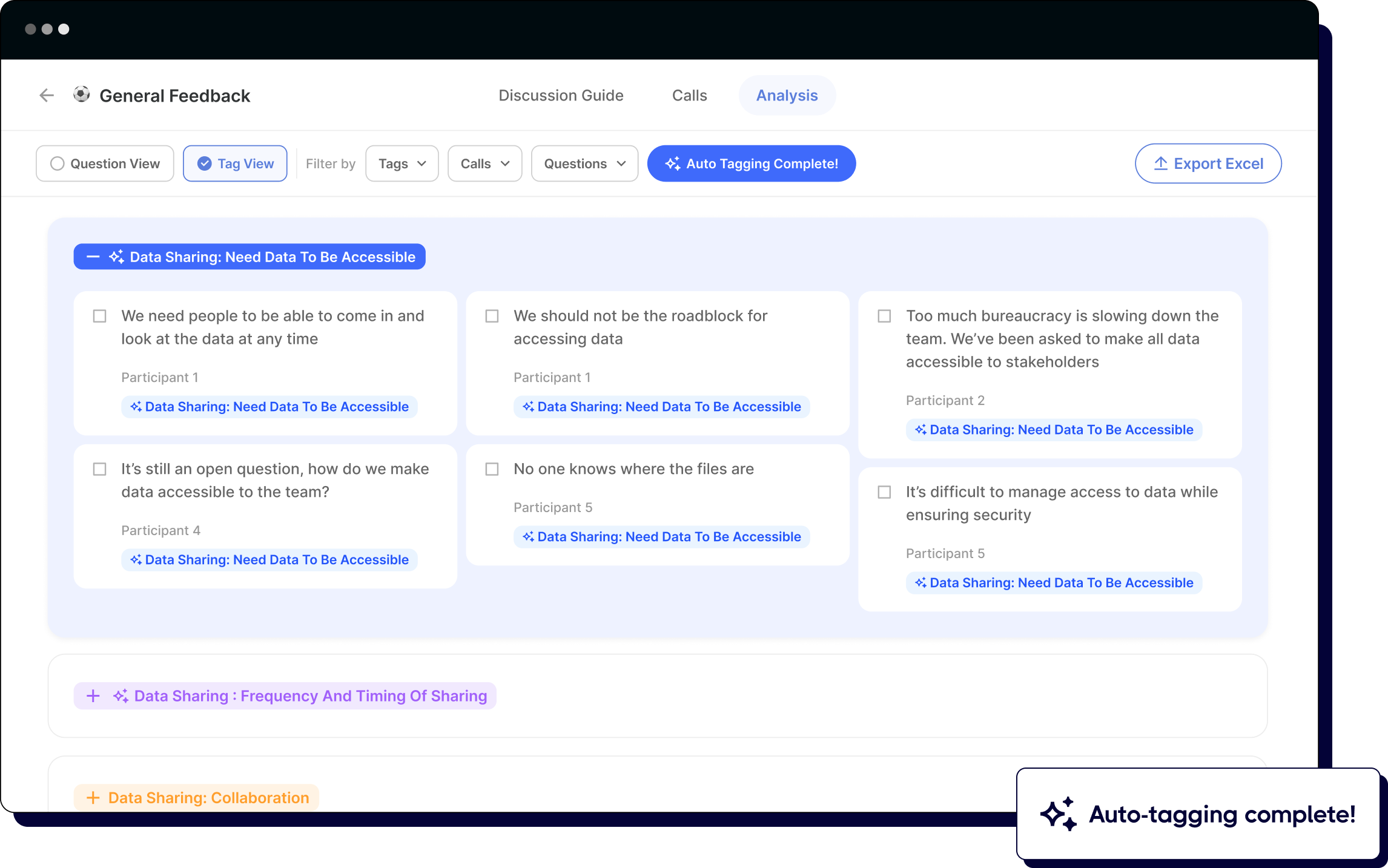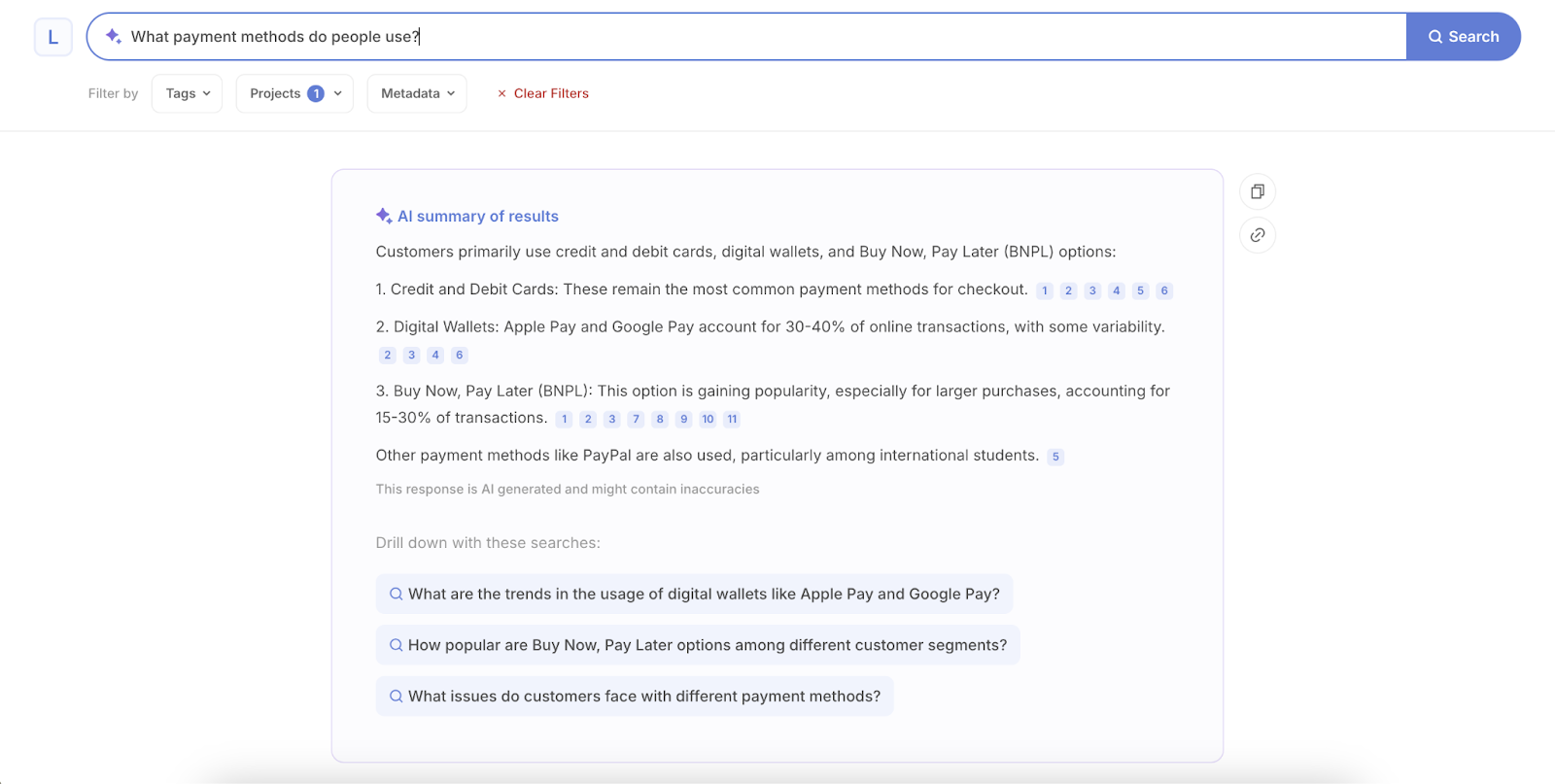Researchers often face a choice between two popular methods: grounded theory vs thematic analysis. While both help make sense of research data like interviews and observations, they serve different purposes and follow different approaches.
In this article, we'll break down the key differences between grounded theory analysis vs thematic analysis in simple terms, helping you choose the right method for your research needs.
TL;DR: Grounded Theory vs Thematic Analysis
What is grounded theory?
Grounded theory represents a sophisticated qualitative research methodology where researchers study data to formulate theories based on their findings. In essence, researchers create new theories from the available database, following an inductive reasoning approach—first collecting data, then developing a hypothesis around it.
The fundamental elements of grounded theory include:
- Data: The theory develops from multiple sources, including interviews, documentaries, and observations, all conducted independently of any theoretical foundation.
- Coding: The manual nature of this methodology requires researchers to categorize and section data systematically.
- Comparison: Collected data generates patterns for analysis, which researchers compare with existing theoretical data to identify differences and formulate new theoretical concepts.
- Theory development: The name "grounded theory" stems from its foundation in real ground data, requiring no supporting theories due to its basis in existing evidence and analysis.
- Saturation: Researchers eventually reach a saturation point where data patterns stabilize, leading to consistent theoretical conclusions.
This methodology finds extensive application in social science, education, and healthcare research, particularly when studying human behavior, interactions, and outcomes.
What is thematic analysis?
Thematic analysis serves as another qualitative research method focusing on textual data from surveys, customer feedback, and interviews. Researchers analyze these texts to identify patterns and themes relating to existing theories.
With modern technology, tools like Looppanel significantly streamline the thematic analysis process. Looppanel's AI-powered system automatically identifies and marks themes, enabling seamless sharing of research insights with team members.
The analysis can follow two approaches: Inductive approach: Data leads naturally to theme identification Deductive approach: Pre-determined themes guide data analysis within existing theoretical frameworks
The thematic analysis process involves:
1. Get an understanding of the data: Researchers thoroughly review data to develop initial insights and theoretical connections.
2. Researching for themes: Careful selection of data elements aligning with research questions.
3. Review the chosen themes: Critical assessment of selected themes, potentially merging similar themes or adding new ones for comprehensive analysis.
4. Report: Creation of a final report synthesizing the collective theme study.
Key differences: thematic analysis vs grounded theory
Here are some key differences between the two methods as per different aspects:
Goal
Grounded Theory: Focuses on developing new theories based on ground data.
Thematic Analysis: Emphasizes identifying themes and patterns without necessitating theory generation.
Approach to data
Grounded Theory: Research progresses simultaneously with real-time data collection, continuously refining results through emerging data patterns.
Thematic Analysis: Follows a structured, sequential process beginning with complete data collection before theme identification.
Theory development vs pattern identification
Grounded Theory: Theory emerges organically from the data, with findings directly informing theoretical development.
Thematic Analysis: Focuses on understanding underlying themes and patterns, emphasizing meaning interpretation over theory justification.
Data coding
Grounded Theory: Employs multiple coding types (open, axial, selective) for systematic theory development.
Thematic Analysis: Offers a more flexible and straightforward coding approach.
Outcome
Grounded Theory: Produces a substantive, generalizable theory applicable across various scenarios.
Thematic Analysis: Delivers detailed theme and pattern descriptions, emphasizing data interpretation and meaning.
Data saturation
Grounded Theory: Explicitly applies the data saturation concept, continuing collection until patterns stabilize.
Thematic Analysis: Allows researchers to conclude data collection upon identifying meaningful themes.
Use of existing literature
Grounded Theory: Minimizes engagement with existing theories during study to prevent bias.
Thematic Analysis: Can incorporate theory-driven approaches and existing theoretical frameworks.
Data analysis process
Grounded Theory: Follows an iterative, cyclic process with multiple rounds of data collection and coding.
Thematic Analysis: Maintains a linear progression from data collection through theme identification to conclusion.
Related read: 5 Thematic Analysis Examples That Reveal Hidden Insights
Strengths and limitations of grounded theory and thematic analysis
Grounded theory
Strengths:
- Theory development: Designed to create new theories rather than test existing ones
- Iterative process: Cyclic approach enables continuous theory refinement
- Deep understanding: Valuable for complex studies requiring in-depth analysis
Limitations:
- Time-consuming: Extensive data collection and coding requirements
- Complexity: Demanding nature of multiple data collection rounds
- Lack of pre-existing frameworks: Absence of established guidelines can pose challenges
Thematic analysis
Strengths:
- Simplicity and accessibility: User-friendly approach requiring minimal theoretical knowledge
- Clear process: Systematic step-by-step methodology
- Adaptable: Flexible application across various theoretical frameworks
Limitations:
- Limited theory development: Focus on pattern identification over theoretical construction
- Risk of oversimplification: May miss nuanced meanings
- Potential transparency issues: Theme derivation process can lack clarity
Explore how thematic analysis differs with other methods:
Content analysis vs thematic analysis
Thematic analysis vs discourse analysis
Framework analysis vs thematic analysis
Affinity mapping vs thematic analysis
Narrative analysis vs thematic analysis
When to use grounded theory vs thematic analysis?
Grounded theory is best suited when you aim to develop new theoretical frameworks, especially in areas where existing theories fall short. This methodology particularly shines in exploratory research where there's limited theoretical foundation. It's the go-to choice when you need to understand complex processes, such as evolving situations or developing social interactions.
Choose grounded theory when:
- You need to develop new theories
- You're exploring understudied areas
- Your research involves complex, evolving processes
- You want to understand intricate relationships between variables
On the other hand, thematic analysis serves a different purpose – it's designed to identify and analyze patterns within data rather than build comprehensive theories. This method offers greater flexibility and works well when you need a structured, descriptive account of your data.
Choose thematic analysis when:
- You want to identify patterns and themes
- You're working within existing theoretical frameworks
- You need a more flexible, adaptable methodology
- You require quick insights into key themes in your data
How can Looppanel help you with your research?
Looppanel is a modern UX research tool that helps researchers simplify their their workflow through several key capabilities:
AI-powered thematic analysis

Looppanel revolutionizes traditional thematic analysis by automatically identifying and tagging themes across research files. What traditionally takes researchers days of manual sorting and organizing can be processed in just 5 minutes through Looppanel. The solution is particularly effective at identifying both main themes and emerging sub-topics, while ensuring all tagged data remains traceable back to source quotes for verification.
Balancing AI efficiency with human expertise
Looppanel takes a practical approach to AI implementation through a human-in-the-loop methodology. While the AI provides about 80% accuracy in initial analysis, researchers maintain control through:
- The ability to edit, remove, or adjust tags as needed
- Direct access to source quotes for verification
- Complete oversight of the analysis process
Comprehensive feature set

Beyond thematic analysis, Looppanel offers:
- High-quality transcription in 17 languages with translation capabilities
- Automatic note-taking that reduces review time by 80% (from 60 minutes to 10-15 minutes per call)
- AI executive summaries for immediate shareable insights
- Smart search functionality that understands context beyond keywords
- Analysis of qualitative open-ended responses for surveys and reviews
The platform emphasizes making researchers look good to stakeholders while significantly reducing manual work, allowing them to focus on interpretation and strategic thinking rather than time-consuming coding t
Conclusion
Both methodologies offer unique strengths in qualitative data analysis. The choice between them depends on research goals, available resources, required theory development level, and data characteristics. While grounded theory employs a structured process aimed at theory building, thematic analysis offers a more flexible approach focused on pattern identification.
Transform your research workflow with Looppanel's innovative platform. Our AI-powered solution automates theme identification, streamlines collaboration, and enhances the overall quality of your qualitative analysis. Book a demo today to explore how Looppanel significantly reduce manual work, allowing researchers to focus on interpretation and strategic thinking.
Frequently asked questions (FAQs)
1. What is the difference between grounded and thematic analysis?
Grounded theory and thematic analysis are both methods used to analyze data qualitatively. Grounded theory is aimed at building a theory from the data, following a structured process. In contrast, thematic analysis is more flexible and focuses on identifying and analyzing themes or patterns within the data without necessarily developing a theory.
2. What is the difference between grounded theory and content analysis?
Grounded theory is the phenomenon of studying data to develop a new theory or study a pre-existing phenomenon that you feel needs more study and analysis to get a better understanding of it. Content analysis is a research method that is used to analyse communication, such as images, text, videos and other media forms.
3. What are the 2 types of thematic analysis?
Thematic analysis is a widely used research method for identifying, analyzing, and reporting patterns or themes within data. There are two main types of thematic analysis they are:
i) Inductive thematic analysis: In this, the themes are taken directly from the data.
ii) Deductive thematic analysis: It is also known as theoretical thematic analysis. In this, the researcher starts with a predetermined set of themes or concepts.
3. What is the difference between grounded theory and narrative analysis?
Grounded Theory is a qualitative research methodology that focuses on generating theories from data rather than testing existing theories. Narrative Analysis is a qualitative research method that focuses on how individuals construct meaning from their experiences by telling.


.png)








.svg)


